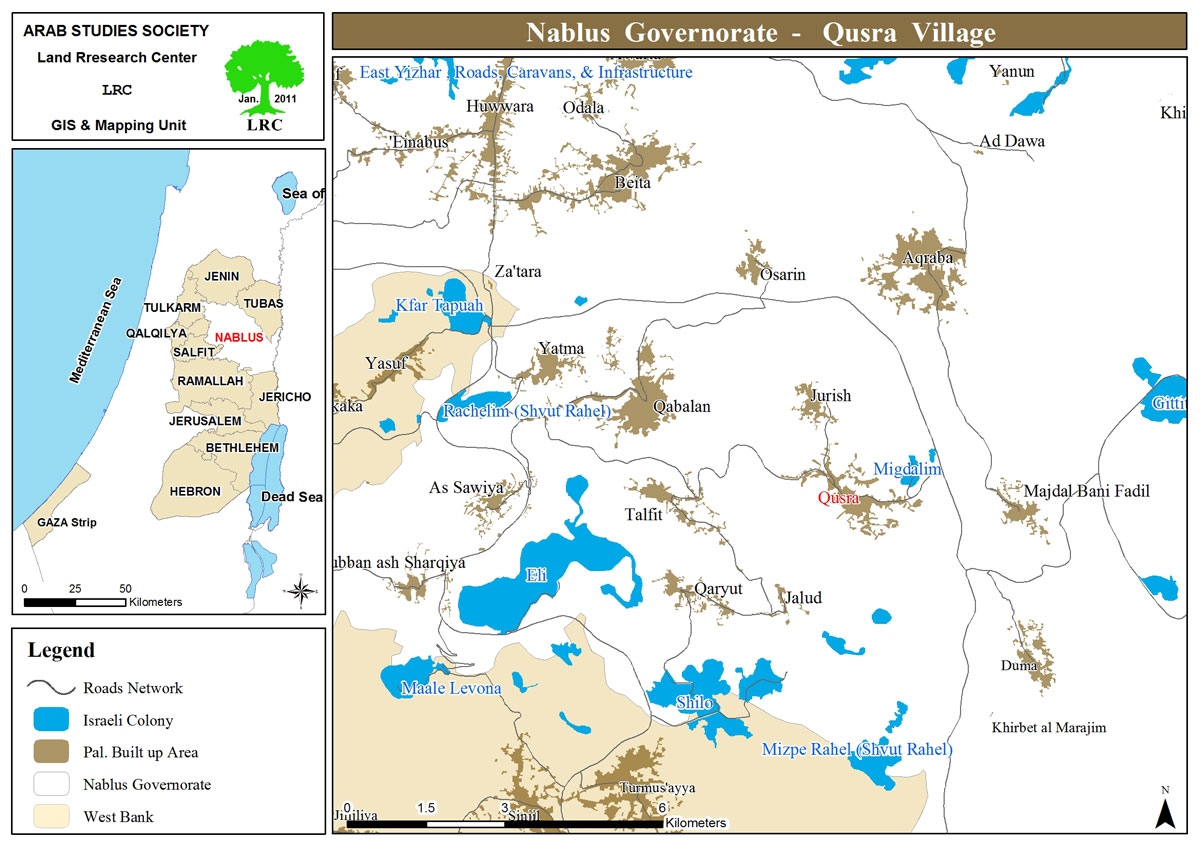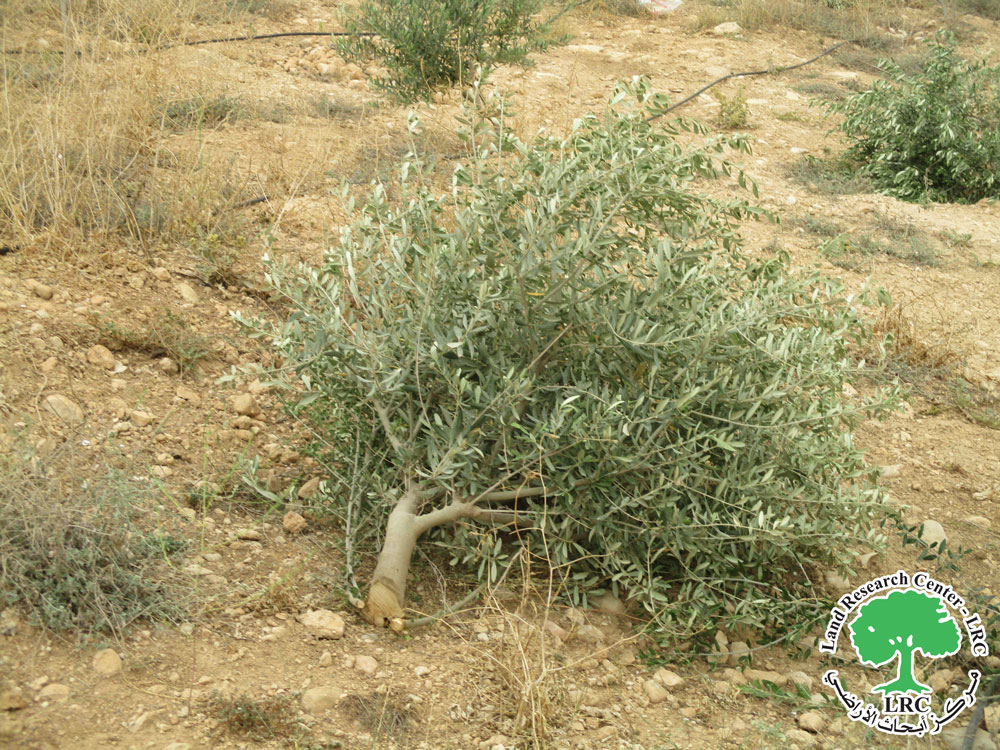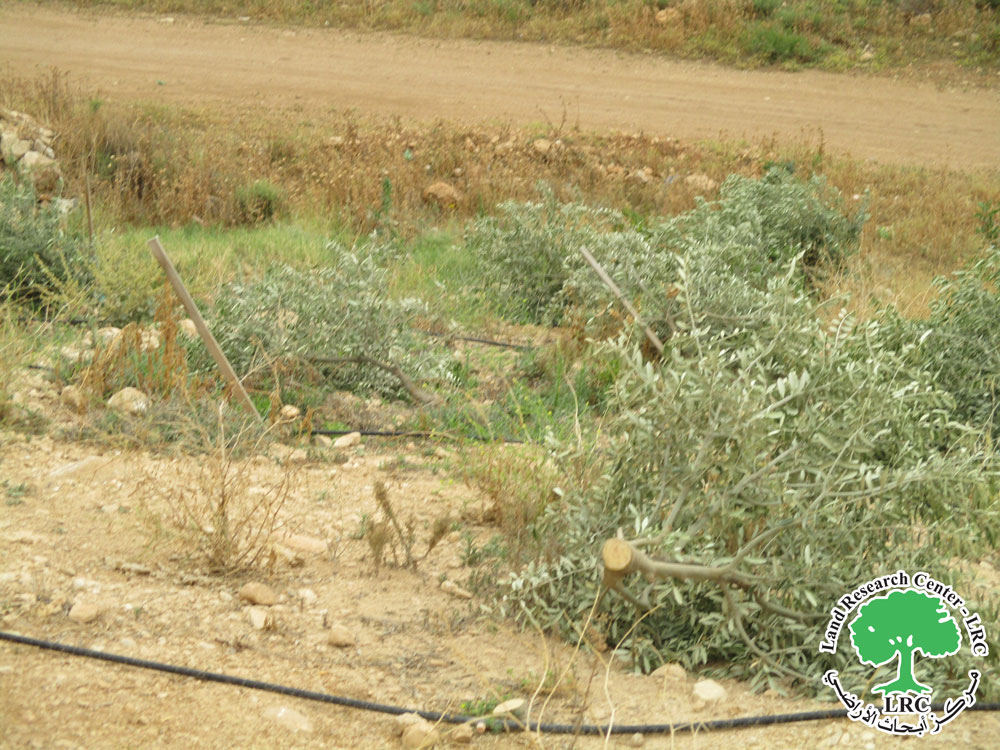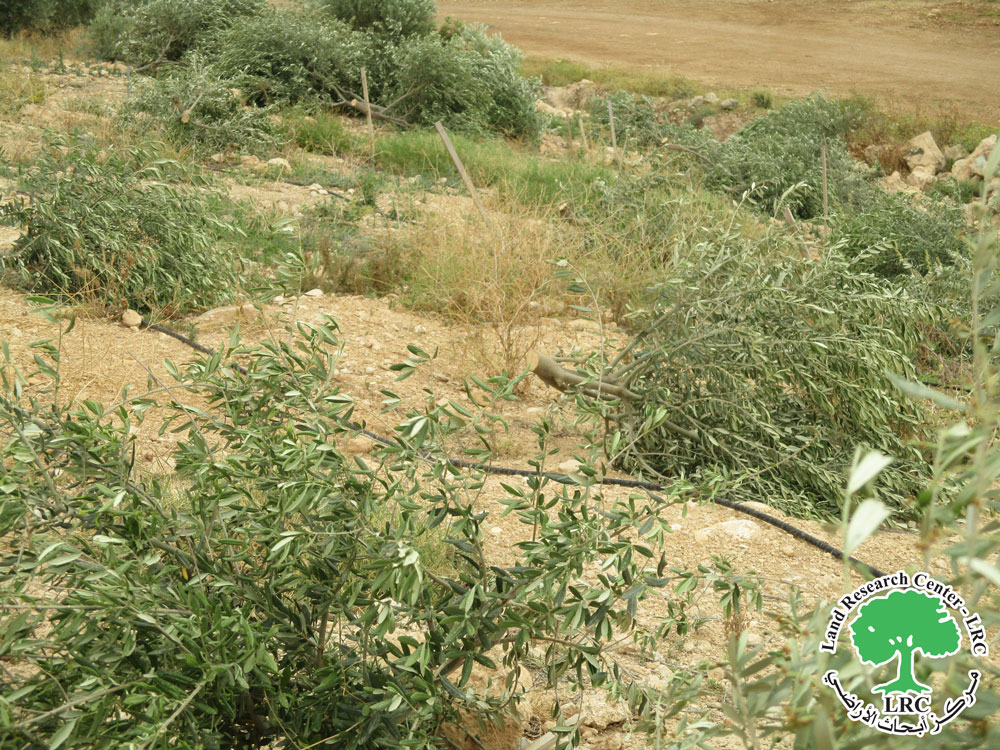During the Harvest Season: Settlers from "Yesh Kodesh" Target Olive Trees in Qusra Town, Nablus Governorate
Violation: Cutting and damaging 20 fruitful olive trees for the second time on the same day.
Location: Qusra town, south of Nablus Governorate.
Date of Violation: 14/10/2024.
Perpetrators: Settlers from the "Yesh Kodesh" colonial outpost.
Affected Party: Farmer Thaer Adel Abdul Hamid Hassan.
Description:
On the afternoon of Monday, October 14, 2024, a group of settlers targeted an agricultural plot planted with olive and almond trees in the "Al-Nabouh" area, located east of Qusra town in Nablus Governorate.
The settlers, armed with sharp tools, attacked the land—spanning 1.5 dunams—during the current olive harvest season. They cut and damaged the branches of 20 fruitful trees, 20 years old, including (12 olive trees, 6 almond trees, and 2 fig trees).
The land belongs to farmer Thaer Adel Abdul Hamid Hassan, a resident of Qusra town. He supports a family of (11), including (6) female and (4) children.
The affected farmer stated:
"While heading to my land with my brothers and relatives to harvest olives, I was shocked to find that the settlers had carried out acts of vandalism, cutting and severely damaging 20 trees on my land. They deliberately cut the branches and destroyed the trees entirely. My land is located just 400 meters away from the 'Yesh Kodesh' colonial outpost.
My land has been subjected to numerous attacks in the past. Settlers have attempted to set fire to my land, causing significant damage. In 2016, a group of settlers physically assaulted me as well."
It is worth noting that Qusra town is one of the area’s most frequently targeted by settler attacks over many years. There are currently three colonial outposts established on the town's lands, all of which contribute to acts of vandalism and arson against agricultural properties. These attacks are often accompanied by the destruction of agricultural infrastructure, including the closure of agricultural roads in the town.
The field research team has documented numerous violations carried out by the Israeli occupation over the years. These include cutting down trees and systematically destroying the agricultural sector in its entirety.
Overview of Qusra Town:
Qusra is located 23 kilometers south of Nablus city. It is bordered by the village of Jurish to the north, Talfit to the west, Majdal Bani Fadel to the east, and is surrounded to the south by the settlement of “Mitspeh Rahel.”
As of 2017, the town's population was 5,418, with a total area of 8,886 dunams, of which 775 dunams are designated as the town’s built-up area.
The occupation has confiscated 223 dunams of Qusra’s land, detailed as follows:
- The settlement of “Migdalim,” established in 1984, has seized 155 dunams and is home to 348 settlers as of 2018.
- The bypass road (508) has taken an additional 68 dunams.
[1] Source: LRC.
The Olive Harvest Season is Full of Risks:
In reality, the issue is not just about security concerns related to granting farmers permits to access their lands during the harvest season. Rather, it is about the occupation's and settlers' deliberate intent to turn these lands into their own playground, where they engage in acts of cutting, burning, poisoning, and overgrazing, culminating in the theft of the olives. For Palestinian farmers, the olive harvest is the culmination of a year-long wait—it is their source of income and provides oil and olives for their households and extended families.
The violation suffered by farmer Thaer Hassan is not an isolated incident. It has been repeated in the same manner for many farmers whose lands are near settlements, bypass roads, or the apartheid wall, among other obstacles.
The occupation targets olive groves near settlements, along with the infrastructure supporting them, such as bypass roads, the annexation wall, watchtowers, and military camps. During the ongoing harvest season, the field research team at the LRC has documented, up until the date of this report, attacks on 7,245 olive trees, most of which are ancient trees, with 65% of them completely destroyed. Additionally, settlers have stolen more than 16,530 kilograms of olives—either by directly picking them from the trees or by stealing them from farmers after the harvest, often assaulting and intimidating the farmers with weapon.
Legal Comment:
The Palestinian environment, in general, is subjected to numerous environmental violations by the Israeli occupation, disregarding all international and national laws and norms related to the protection of environmental rights. The right to live in a clean and healthy environment is an inherent human right since the dawn of creation. The occupation often tries to appear as though it is committed to international environmental concerns, despite having signed major environmental protection agreements, including the Bazel Convention in 1989, the Rotterdam Convention in 2008, the Stockholm Convention in 2001, and the Ramsar Convention in 1971, as well as air quality and climate protocols. However, it continues to violate all of these treaties without accountability or oversight.
In addition to the provisions related to the right to enjoy a clean and healthy environment for all those living under military occupation, as stipulated by international laws, conventions, and treaties, such as the International Covenant on Economic, Social, and Cultural Rights, under UN General Assembly Resolution 2200A (d-21) dated December 16, 1966, Article 1, Paragraph 2:
"All peoples have the right to freely pursue their economic, social, and cultural development, and freely dispose of their natural wealth and resources without prejudice to any obligations arising from international economic cooperation based on the principle of mutual benefit and international law. In no case may a people be deprived of its own means of subsistence..."
There is no doubt that the violations committed by the Israeli side contravene the laws of the "occupying power" before any other laws. Referring to the details of this case, the Israeli Penal Code of 1977 and its amendments stipulate that trespassing on someone else's property to commit a crime punishable by law is a violation. Article 447 states:
"Anyone who does any of the following with the intent to intimidate, insult, or harass the property owner, or to commit a crime, shall be punished by imprisonment for two years:
(1) Enters or crosses the property;
(2) After entering the property legally, remains there illegally.
(b) A crime is committed under this section when the perpetrator carries a firearm or a cold weapon, and the punishment is imprisonment for four years."
By reading the text of this article, we see that the Israeli Penal Code criminalizes the mere act of entering someone else's property without permission, with the intent to insult, harass, or intimidate. This act is punishable by two years in prison. The punishment increases if the offender enters the property and commits a crime, such as using a weapon or a sharp object, or any other form of assault, like treating the land as if it were their own and using it as they wish. This is explicitly criminalized in the mentioned section of the Israeli Penal Code.
Therefore, by cutting down the trees, the Israeli aggressor caused a blatant environmental pollution in the area, violating both international laws and treaties, as well as the internal laws of the "occupying power," in clear violation. As such, the "Israeli judiciary" should hold the settlers accountable and punish them for these actions according to their legal provisions. However, there has been no legal accountability for the aggressor by the Israeli judiciary. This, however, does not negate the right of any person on this land to live in a clean, healthy, and safe environment free from any violations or attacks.
- مشروع: حماية الحقوق البيئية الفلسطينية في مناطق "ج" SPERAC IV - GFFO
Disclaimer: The views and opinions expressed in this report are those of Land Research Center and do not necessarily reflect the views or positions of the project donor; the Norwegian Refugee Council.
إخلاء المسؤولية: الآراء ووجهات النظر الواردة في هذا التقرير هي آراء ووجهات نظر مركز أبحاث الأراضي ولا تعكس بالضرورة وجهات نظر أو مواقف الجهة المانحة للمشروع؛ المجلس النرويجي. للاجئين
The attached photos show the effects of the settlers of "Yesh Kodash" attacking the olive trees in Qusra - Nablus




